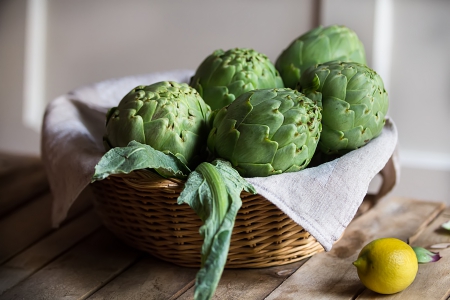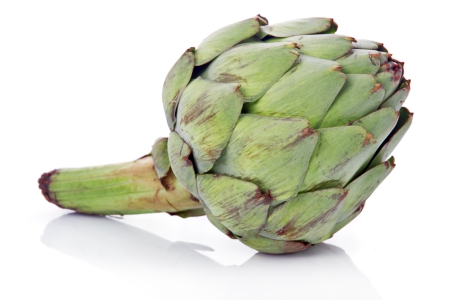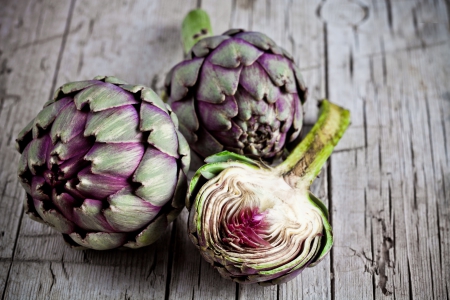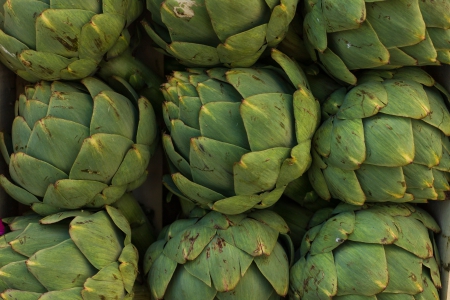Artichoke is one of the most nutritious food stuffs, extensively used for centuries in favor of numerous medicinal purposes.
Nutritional overview
- It contains very less amount of carbohydrates, but it is significantly high in fibre
- It contains significant amount of proteins
- It contains unsaturated fatty acids (especially PUFA) but does not contain cholesterol and saturated fat
- It contains several vitamins like Vitamin C, Vitamin K, Vitamin B1, B2, B3, B6 and B9
- It contains numerous trace elements like calcium, phosphorus, zinc, magnesium, iron, manganese and potassium
- It also contains polyphenolic compounds
Health benefits
Role on hepatic health
- It helps to protect the liver from damages and helps to promote hepatic functionality
- Especially artichoke leaf extract is very effective for synthesizing new hepatic tissue
- It helps to reduce the susceptibility of developing fatty liver disease by decreasing fatty infiltration of liver as well as hepatic cell necrosis
- It helps to improve the symptoms of nonalcoholic fatty liver diseases as well
- Silymarin and cynarin components of artichoke are accountable for protecting the liver from oxidative as well as from inflammatory damages and help to reduce fat deposition, which promotes hepatic health
- It also helps to reduce the prevalence of gall bladder diseases

Role on digestive health
- Artichoke contains inulin (a fibre) that acts as prebiotic and helps to promote the growth of intestinal beneficial bacteria that improves gut health
- Its fibre content is responsible for preventing constipation by facilitating defecation as it helps to make the stool bulky and soft
- It is also associated with reducing the prevalence of indigestion, bloating, diarrhea and abdominal discomfort
- Cynarin component of artichoke helps in fat digestion by enhancing bile production. It is also responsible for improving gut health as it is closely related with accelerating gut movement
- It has seen that consumption of artichoke especially artichoke leaf extract significantly helps to reduce the prevalence of irritable bowel syndrome
- It has antispasmodic effect, which helps to prevent gastrointestinal muscular spasm
- It also helps to protect the gastrointestinal tract from inflammatory damages that helps to reduce the prevalence of inflammatory bowel disease and ulceration
Anti-carcinogenic effect
- Artichoke contains various important compounds such as rutin, gallic acid, silymarin and quercetin, which play significant role in reducing the risk of carcinoma.
- It mainly helps to prevent the growth of cancerous cells by inducing apoptosis and suppress tumor cell growth by preventing their proliferation
- Its flavonoid contents are also responsible for destroying pancreatic cancerous cells and their metastasis
- Its apigenin content is especially accountable for reducing the prevalence of breast cancer

Role on immunity
- It plays significant role in improving the immunological responses of the body
- It contains very high number of polyphenols, which are responsible for repairing cellular damages and stimulates immune function
- Its antioxidant components are also accountable for boosting up the immunity by reducing the prevalence of free radicals induced oxidative damages
- Consumption of artichoke is greatly related with reducing the susceptibility of developing communicable as well as non-communicable diseases
Role on detoxification
- It helps to make the body healthy by eliminating toxins
- It basically helps to improve the function of liver, which is closely related with detoxification process
- It has seen that phenols and acids found in artichoke are responsible for stimulating bile secretion from liver that helps to expel toxins from body
- Silymarin and cynarin (antioxidant) components of artichoke are also responsible for eliminating harmful toxins from body
- It also helps to stimulate the elimination of excretory products by increasing urination
Role on preventing allergy
- It is very effective for reducing allergies as well as asthma
- Its folic acid content is considered as the principal compound responsible for preventing allergic reaction as it helps to prevent inflammation

Role on preventing hang over
- It is very effective for preventing hang over as it has a positive effect on liver
- It is associated with eliminating toxins from blood that helps to treat hang over quickly
- It is better to chew artichoke leaves after heavy drinking for curing deadly hangover
Role on skin
- It helps to protect the skin from oxidative damages and from infections
- It helps to improve skin elasticity
- It also helps to hydrate the skin
- It is associated with minimizing enlarged pores of sagging skin
- It also helps to prevent ageing
- It has seen that its application is very effective for healing skin burns more rapidly
Therapeutic usages
Effect on cardiovascular system
- It acts as an effective therapeutic substance for promoting cardiac health and reduces the prevalence of cardiac morbidity and mortality rate
- Its magnesium, potassium and phosphorus contents have great cardio protective effects and help to reduce the prevalence of heart attacks and strokes
- It also helps to reduce the prevalence of atherosclerosis by preventing fat accumulation within artery and hence decreases the risk of developing coronary artery diseases
- Its fibre contents are also responsible for improving the health of blood vessels by preventing plaque formation and enhances blood circulation, which is related with reducing hypertension
- It also helps to protect the heart from oxidative damages and promotes cardiac functionality

Role on regulating cholesterol level
- It has seen that consumption of artichoke leaf extract has a positive effect on lipid profile
- It helps to decrease the concentration of total cholesterol as well as LDL within body
- Luteolin content of artichoke is also responsible for inhibiting the formation of cholesterol
- It helps to improve the level of good cholesterol (HDL) in body and maintains the proper ratio of LDL and HDL
Hypoglycemic effects
- It is extensively used for regulating blood sugar level hence its consumption is very useful for diabetic patients
- Its fibre content is considered as the main compound responsible for reducing blood sugar concentration as it helps to decrease glucose absorption from intestinal epithelial cells
- It is especially very effective for reducing fasting blood sugar level
Role on preventing anaemia
- It is considered as a good source of iron (plant based), which is associated with synthesizing hemoglobin, hence its consumption is very effective for reducing the risk of developing iron deficiency anaemia

Role on weight management
- It is widely used for maintaining a healthy body weight as it helps to enhance metabolic rate
- It contains significant amount of soluble fibre that helps in weight reduction by stimulating satiety which decreases overall food intake and calorie consumption
- It also helps to prevent obesity and its harmful consequences by inhibiting the accumulation of visceral fat
General consideration of using artichoke
- It is better to choose green, fresh and firmest artichoke for consumption
- It can be consumed raw, but it takes long time for digestion, hence it is better to consume cooked artichoke. It can be boiled, steamed and baked
- It is better to avoid artichoke consumption during pregnancy and lactation
- Individual having gall stones or bile duct obstruction should avoid its usage as it increases bile flow, which may worse the condition

Source:
Bekheet, S. and Sota, V., 2019. Biodiversity and medicinal uses of globe artichoke (Cynara scolymus L.) plant. Journal of Biodiversity Conservation and Bioresource Management, 5(1), pp.39-54.
Biel, W., Witkowicz, R., Piątkowska, E. and Podsiadło, C., 2020. Proximate composition, minerals and antioxidant activity of artichoke leaf extracts. Biological Trace Element Research, 194(2), pp.589-595.
Gerschenson, L.N., Fissore, E.N., Rojas, A.M., Bernhardt, D.C. and Santo Domingo, C., 2020. Artichoke. In Nutritional Composition and Antioxidant Properties of Fruits and Vegetables (pp. 55-69). Academic Press.
Gostin, A.I. and Waisundara, V.Y., 2019. Edible flowers as functional food: A review on artichoke (Cynara cardunculus L.). Trends in Food Science & Technology, 86, pp.381-391.
Sahebkar, A., Pirro, M., Banach, M., Mikhailidis, D.P., Atkin, S.L. and Cicero, A.F., 2018. Lipid-lowering activity of artichoke extracts: a systematic review and meta-analysis. Critical reviews in food science and nutrition, 58(15), pp.2549-2556.
Santos, H.O., Bueno, A.A. and Mota, J.F., 2018. The effect of artichoke on lipid profile: A review of possible mechanisms of action. Pharmacological research, 137, pp.170-178.
Valero, D. and Serrano, M., 2019, March. Bioactive compounds with health benefits of artichoke and cardoon. In X International Symposium on Artichoke, Cardoon and Their Wild Relatives 1284 (pp. 221-226).
Young, C., 2018. Globe Artichoke. Globe.




